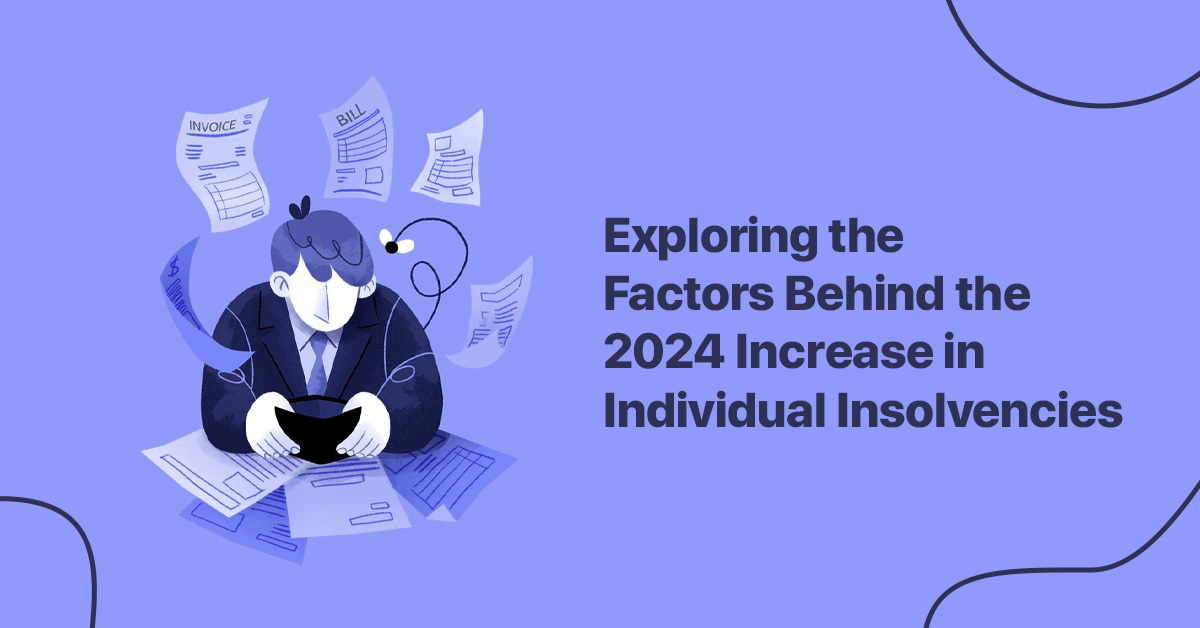The rise in individual insolvencies in 2024 has become a pressing concern across the UK. Understanding the underlying factors contributing to this increase is important for both individuals and financial advisors. This blog explores the 10 key drivers behind the increase in individual insolvencies this year, offering a detailed analysis of how these factors interplay and affect overall financial stability. By examining these drivers, readers can gain valuable insights into managing and mitigating insolvency risks effectively.
1. Post-pandemic economic recovery
The economic aftermath of the COVID-19 pandemic has left a lasting impact on many individuals’ financial situations. Despite efforts to stimulate recovery, certain sectors are still struggling. Job losses, reduced working hours, and ongoing uncertainties have placed significant financial strain on individuals, contributing to an increase in insolvencies. The slow pace of recovery in some areas has made it difficult for individuals to regain financial stability.
2. Inflation and cost of living
Inflation rates in 2024 have reached levels that have severely impacted household budgets. The rising cost of essential goods and services, including food, energy, and housing, has put extra pressure on finances. For many, wages haven’t kept pace with inflation, leading to increased debt and a higher likelihood of insolvency. The squeeze on disposable income has made it harder for individuals to manage existing debts and maintain financial stability.
3. Increasing personal debt levels
The levels of personal debt in the UK have been steadily increasing, driven by a range of factors including easy credit access and consumer spending habits. High levels of unsecured debt, such as credit card balances and personal loans, can become unmanageable, especially when combined with rising living costs. This accumulation of debt often leads to financial difficulties and, in some cases, insolvency.
4. Difficulty in debt management
Many individuals struggling with debt face challenges in managing their financial obligations. Poor financial planning, lack of financial education, and inadequate debt management strategies can make the situation worse. Individuals who are unable to seek professional advice or find suitable debt solutions may find themselves overwhelmed, leading to an increased risk of insolvency.
5. Job market fluctuations
Changes in the job market have played a major role in the rise of individual insolvencies. Economic instability, downturns in specific industries, and shifts in employment trends have caused job losses and lower incomes for many. Those who are unemployed or underemployed often find it hard to keep up with their financial obligations, leading to more cases of insolvency.
6. Gig economy and irregular income
The growth of the gig economy has introduced income variability for many individuals. While flexible work opportunities can be beneficial, the irregularity of income from gig work can make financial planning and debt management challenging. This inconsistency can lead to financial instability and a higher likelihood of insolvency for those relying heavily on gig-based income.
7. Rising interest rates
In 2024, interest rates have seen an upward trend, affecting borrowing costs across the board. Higher interest rates increase the cost of servicing existing debt and can lead to higher monthly payments. For individuals with variable-rate loans or credit card debt, this rise in interest rates can strain their finances further, contributing to an increase in insolvencies.
8. Mortgage and loan affordability
The increase in interest rates has also impacted mortgage and loan affordability. Individuals with mortgages or large loans may find themselves struggling to keep up with higher repayments. This can lead to arrears and, in severe cases, insolvency. The pressure of meeting these higher costs can push individuals who were previously managing their finances well into financial difficulty.
9. Health issues and unexpected expenses
Unexpected health issues or personal emergencies can have a significant impact on an individual’s financial situation. Medical costs, loss of income due to illness, or unplanned expenses can deplete savings and lead to financial instability. These unforeseen events often exacerbate existing financial challenges and can contribute to an increase in insolvencies.
10. Lack of financial resilience
Financial resilience is important for weathering economic pressures and managing unexpected challenges. Individuals who lack financial resilience, due to inadequate savings or poor financial planning, are more vulnerable to insolvency. Building a financial safety net and having a robust plan for managing debts is essential for mitigating the risk of insolvency.
Support measures and relief programmes
In response to the rising insolvency rates, the government has introduced various support measures and relief programmes. These include financial help, debt relief schemes, and adjustments to insolvency laws. While these measures aim to provide relief and support, their effectiveness can vary depending on individual circumstances, the specific challenges faced, and how well the programmes are implemented and tailored to diverse needs.
Effectiveness of policy interventions
The effectiveness of policy interventions in addressing the increase in individual insolvencies can be mixed. While some individuals benefit from available support, others may find it challenging to access or qualify for relief programmes. The success of these interventions in stabilising personal finances and reducing insolvency rates depends on their reach, accessibility, and alignment with the specific needs of those affected, as well as their ability to adapt to changing financial circumstances.
Key takeaways
The rise in individual insolvencies in 2024 is fuelled by a mix of economic pressures, higher living costs, growing personal debt, and job instability. These interconnected factors create a challenging environment for many individuals struggling to manage their finances. Understanding these drivers is important for both those facing financial difficulties and the advisors helping them handle these tough times. By identifying the key causes of this trend, stakeholders can develop more effective strategies to tackle the root issues, offering better support and solutions to enhance financial stability and resilience. This proactive approach can help individuals regain control of their financial futures and avoid insolvency.
Ask an expert
If you need help with managing debt or managing insolvency matters, our team is here to help. Call us on 0800 246 1845 or email us at mail@leading.uk.com for expert guidance and personalised support. We’re committed to helping you handle your financial challenges effectively and find the best solutions for your situation.






